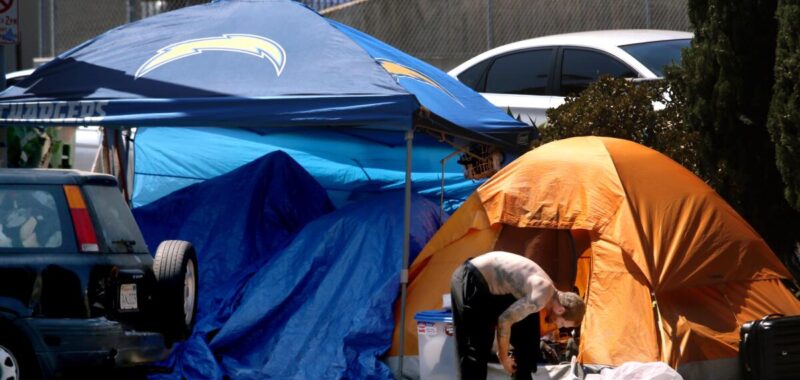The Los Angeles County Board of Supervisors on Tuesday voted unanimously to support a motion affirming that its jails won’t be used to hold homeless people arrested in the enforcement of anticamping ordinances.
The five-member board reaffirmed the approach, which county officials have said is already in effect. The move came days after Gov. Gavin Newsom ordered state agencies to remove homeless encampments in their jurisdictions and encouraged cities to do the same, citing the U.S. Supreme Court’s Grants Pass ruling, which cleared the way for more aggressive enforcement of anticamping laws.
“We’re not going to go to a race to the bottom,” said Supervisor Hilda Solis, the motion’s co-author. “We’re not going to turn our backs. We’re not going to use our jails to somehow incarcerate and criminalize people who are on the street.”
Co-author Supervisor Lindsey Horvath slightly amended the original motion to clarify that it is meant to address how the county handles arrests “solely due to enforcement of anticamping ordinances,” consistent with the county’s current practice.
Someone who is endangering public safety or committing other crimes at an encampment could still be arrested and jailed, she said.
“We aren’t saying that if there’s violent crime happening at a homeless encampment that that is not an arrestable offense,” Horvath said. “We aren’t saying anything like that at all, in fact, what we’re being clear about is that we are not criminalizing poverty or homelessness.”
During the meeting Tuesday, which also included a broader discussion on the impact of the Grants Pass ruling on the county, local officials repeatedly said they did not believe arresting and jailing homeless residents for living in encampments would lead to a reduction in homelessness.
“Criminalization is intentionally not part of the county’s framework because it makes the problem worse by creating more barriers along people’s path to housing,” said Va Lecia Adams Kellum, CEO of the Los Angeles Homeless Services Authority.
Sheriff Robert Luna said the motion is in line with the department’s current approach, in which misdemeanors don’t typically lead to jailing unless specific criteria are met.
“Being homeless is not a crime and we will maintain our focus on criminal behavior rather than an individual’s status,” Luna said.
Several pubic speakers expressed support for the motion and for the county’s broader “care first” approach to homelessness.
“Being homeless should not be a crime,” said West Covina Mayor Brian Calderón Tabatabai. “All of us must be clear that we all have a responsibility to provide shelter to our unhoused residents.”
But some also expressed frustration with the pace of the county’s efforts to move people out of encampments and bring them into temporary housing and said that local communities need more resources to address the housing crisis.
“Clearly no one is advocating that our unhoused community members be housed in the county jail, however cities are overwhelmed with homelessness needs and the proliferation of encampments in their communities,” said Bea Dieringer, president of the Los Angeles County Division of the League of California Cities. “They desperately need the county’s help to increase homeless shelters, services and other resources to meet their urgent community needs.”
The county this year has committed more than $120 Million to its Pathway Home program, its counterpart to Mayor Karen Bass’ Inside Safe encampment cleanup program.
Supervisors and several speakers also expressed concern that the governor’s order and the Supreme Court’s decision could lead to a challenging mismatch of approaches across the county’s 88 cities and unincorporated communities in which some cities end up pushing homeless residents into neighboring communities.
The motion adopted also directs the county to help lead a convening of cities “with the goal of minimizing disparate impact of the Grants Pass ruling across all the jurisdictions in the County.”
“We don’t want L.A. County to be seen as rolling out the welcome mat for the nation’s unhoused population to come to Los Angeles,” Horvath said, “and there’s also concern that we don’t want to diverge from the path we have seen that works.”

